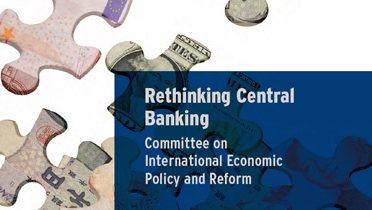This report was written by The Committee on International Economic Policy and Reform, a non-partisan and non-ideological group of independent experts, comprised of academics and former government and central bank officials. The objective of the group is to analyze global monetary and financial problems, offer systematic analysis and advance reform ideas that would ordinarily not emerge from official processes.The Committee will identify areas in which the global economic architecture should be strengthened and work to develop solutions that attempt to reconcile national interests with broader global interests. It will attempt to offer useful suggestions to national policy makers and international financial institutions and foster public understanding of the key issues in global monetary management and economic governance. In this September 2011 report, the committee lays out a framework for rethinking central banking in light of lessons learned in the lead-up to and aftermath of the global financial crisis.
Committee Members
Barry Eichengreen, University of California, Berkeley
Mohamed El-Erian, PIMCO
Arminio Fraga, Gavea Investimentos
Takatoshi Ito, University of Tokyo
Jean Pisani-Ferry, Bruegel
Eswar Prasad, Cornell University and Brookings Institution
Raghuram Rajan, University of Chicago
Maria Ramos, Absa Group Ltd.
Carmen Reinhart, Peterson Institute for International Economics
Helene Rey, London Business School
Dani Rodrik, Harvard University
Kenneth Rogoff, Harvard University
Hyun Song Shin, Princeton University
Andres Velasco, Harvard University
Beatrice Weder di Mauro, University of Mainz
Yongding Yu, Chinese Academy of Social Sciences
REPORT INTRODUCTION
The Golden Age of Inflation Targeting
High inflation in the advanced economies in the 1970s and in emerging economies in the 1980s and 1990s was instrumental in shaping modern thinking about the practice of central banking. The tenets of the resulting framework are familiar and, to a large extent, uncontroversial. First, there is no permanent tradeoff between inflation and unemployment— a sustained higher level of inflation does not lead to higher growth and a sustained lower level of unemployment. Second, high and volatile inflation depresses growth and distorts the allocation of resources. Third, inflation disproportionately harms the poorest segments of society, which lack instruments for protecting themselves from its disruptive effects. For all of these reasons, price stability is the cornerstone of monetary policy.
The actions needed to achieve price stability, such as the maintenance of high interest rates, can be politically unpopular, among other reasons because they slow growth. It follows that the pursuit of price stability can be made more credible and thus more effective by granting independence or at least operational autonomy to the central bank. Otherwise, central banks may be subject to political pressure to attach greater weight to other objectives, making it harder for them to contain inflationary expectations and deliver desirable outcomes.
View the full report »



